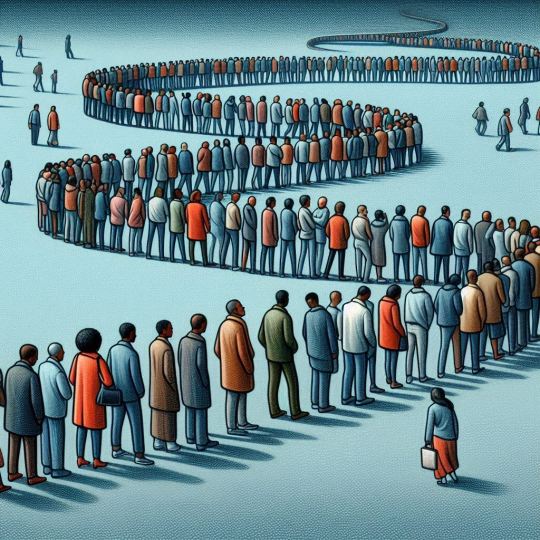#LittlesLaw
Explore tagged Tumblr posts
Text
Why we wait
A guest blog by Sukhi ...

Created with Bing Image Creator, 10th December 2024
So much waiting!
Maybe it's been an unlucky month, but I'm noticing more and more how much I simply have to wait around for other people to do things.
It's not like this in 'Space Ace'. I guess that's one of the reasons why I like gaming - no waiting around for other people.
We British are stereotyped for our love of queueing (the 'national sport') but if that were ever true, those days are certainly long-gone. Now, I think most of us thoroughly dislike waiting—especially for something simple. I know Vanessa feels the same way, although she's a bit more patient than I am.
So why are we seeing more of this all the time? It's pretty ironic, in this digital age, when so many things seem to move so much faster.
Well, we've got increasing strain on public services like healthcare. So that's a factor. But there's something more insidious going on. Something that seems to apply equally well across healthcare, and higher education, ... in fact across all industries. We're all trying to do too many things at once. We're caught-up in the drive for efficiency.
Colin told me a couple of years ago that the main reason houses sell so slowly in the UK is because conveyancers (the lawyers handling moves) each run over 100 cases at the same time. That's mind-blowing if it's true. But even if the number is half that, I find it almost impossible to image how they stay focused. And with so much context-switching, it's hard to imagine how they would ever complete even one case. Certainly it would explain why so much chasing is needed on both sides of the sale.
We might expect that efficiency and speed come together, but I've been polling opinion in the Digital and CTO communities, and interestingly efficiency is often at odds with speed.
When we seek to maximise efficiency, blinkered to other objectives, we often home-in on spare cycles and fill them with extra work. But putting more load into a system tends to create more queues (see Little's Law). It can easily overload other parts of the system, but also makes the focus part less tolerant of any unplanned load.
In fact, graphing the implications of the law shows that wait times increase dramatically once any part of a system is busy more than 80% of the time. If we want speed in any unscheduled system, we need lower utilisation.
And if we're waiting for someone else to do something, but still measured on utilisation, how do we react? Instead of waiting patiently, we go off and do something else, meaning others are now more likely to be waiting for us! There's a compound effect here that's often overlooked.
Turns-out that the whole world is caught-up in this outmoded mindset.
On the bright side though, it's a great argument for digital transformation. If we can automate work, we can speed it up, and allow one human to self-serve at their own pace.
And it's a great argument for Agile too. At Ridgemoor we're always keen to 'unspecialise' our teams, creating fast-moving, multi-skilled squads so that (even with work we can't codify in advance) we can get stuff done without sitting in a succession of queues. Every time an unfamiliar task comes along, we just get on with it, instead of looking around for the cavalry to come.
So that's my message of hope. And another reason I'll be advocating for Agile everywhere I go! Looks like Carla is inspired to take-up the cause, and I'll be first in the queue to help her!
The views expressed in this article are Sukhi's alone, and don't necessarily reflect those of anyone in the real world ... except perhaps Jeremy's.
0 notes
Text
How many toilets do you need in a Theatre? #MoreLoos #LittlesLaw
http://bit.ly/2PGQlOb - Careful With That Axe, Eugene
0 notes